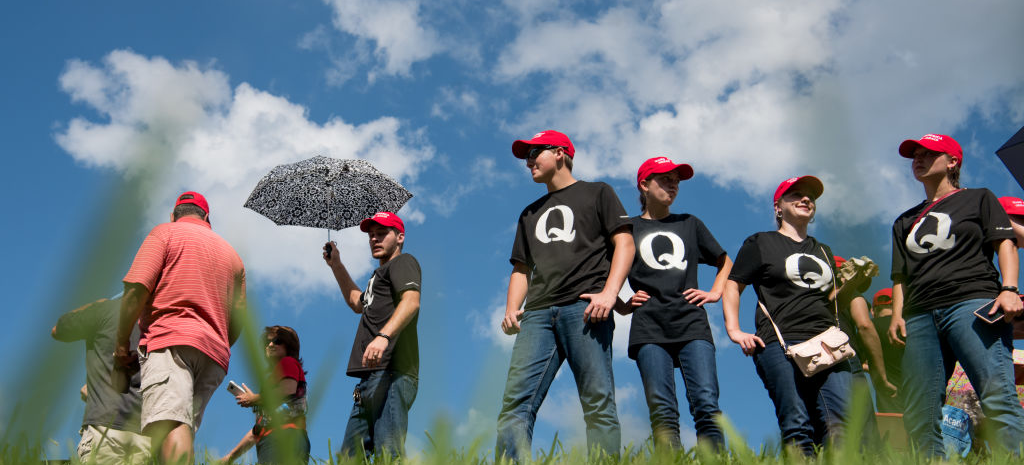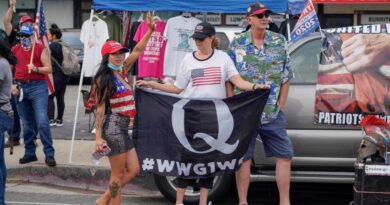COVID and conspiracy – OpenCanada

The ebb and flow of the ongoing COVID-19 pandemic has forced Canadians to spend more time indoors than ever. While this has been good for at-home baking, it also means Canadians are spending more time online, and the online world can be a breeding ground for far-right radicalization and extremist conspiracy theories.
QAnon is one such conspiracy theory that has swept the world by storm, and Canada’s QAnon community may be among the top four or five largest anywhere, according to Concordia University researcher Marc-André Argentino.
QAnon emerged in October 2017 on 4Chan, an anonymous image-messaging board popular with white-supremacists and anti-Semites. In a thread titled “Calm Before the Storm,” a user signing off as “Q” claimed access to top-secret government information and said Hillary Clinton would soon be arrested. The user would post more than 5,000 cryptic messages between 2017 and 2020, according to a timeline constructed by Forbes.
QAnon members believe there is secret global child sex ring run by liberal, political and financial elites. While the user known as Q has not posted since December 8 (and experts say is unlikely to do so again), his or her impact on QAnon adherents lingers. Followers now posit theories of their own. A recent one claims former U.S. president Donald Trump is still living in the White House and serving as president.
QAnon followers, (known as Anons) were seen fighting alongside the Proud Boys and the Three Percenters at the January 6th attempted insurrection on Capitol Hill, according to the Washington Post. The Proud Boys are self-described Western chauvinists and function much like a gang, according to the Anti-Defamation League. The Three Percenters are a right-wing libertarian militia group.
In February and June respectively, the Canadian government identified these two groups as ideologically motivated violent extremist entities (IMVEs) and added them to its list of terrorist entities.
Kurt Phillips, a board member of the Canadian Anti Hate Network, an NGO, likens QAnon to a cult. Adherents can become so obsessed with conspiracy theories that they cut ties with family and friends for not supporting their beliefs. That doesn’t mean those involved simply consume and spread disinformation. Phillips cites the example of Corey Hurren, a Manitoban who, last year, crashed his truck through the pedestrian gate of Rideau Hall before entering the grounds armed and on foot in an attempt to speak with Prime Minister Justin Trudeau. Hurren posted QAnon-related content on his business Instagram account that morning. He has since been sentenced to six years in prison.
QAnon, however, has not joined the Proud Boys and Three Percenters on Canada’s list of terrorist entities. Phillips thinks this is because QAnon is more of an ideology than a network or group.
That makes it difficult to track and investigate those who may be influenced by it, says Ghayda Hassan, a psychologist and founder and director of the Canadian Practitioners Network for the Prevention of Radicalization and Extremist Violence, a network funded by Public Safety Canada’s Community Resilience Fund.
“QAnon has not reached the threshold of demonstrating that they have a clear, extremist ideology, with a clear purpose, with a clear organization to actually attack, harm, kill specific members of the society based on their religion, skin color, ethnicity,” she says, adding the movement attracts all sorts of individuals who may be distressed and anxious about COVID-19 or about their life situation.
“These individuals are not extremists. A lot of them would never resort to violence and would never be extreme if they weren’t in a crisis situation. We should not criminalize people who are just in a vulnerable position, who are likely to abandon QAnon once they understand, once they get disillusioned or once their own personal or social situation changes.”
“It shouldn’t be illegal to believe weird things.”
Yet in the United States, QAnon has been linked to a number of violent crimes, kidnappings and a murder, writes Gabriele Cosentino in his 2020 book, Social Media and the Post-Truth World Order. Last year, for example, a Colorado mother was charged with conspiracy to commit second degree kidnapping after allegedly working with a network of QAnon supporters to have her son kidnapped from foster care.
The FBI identified QAnon as a potential domestic terror threat in May 2019.
QAnon adherents in Canada likely mirror their American counterparts in beliefs and motivations. A new report by the Institute for Strategic Dialogue, an international think tank, highlights the extent to which the Canadian right wing extremist ecosystem appears to be heavily influenced by U.S. activity. The study found Canadian right-wing extremists mentioned the U.S. more than Canada on social media platforms and took a particular interest in Donald Trump.
Canadian authorities, however, have not made a similar declaration about QAnon as have their American counterparts. That’s a prudent course of action, according to Amarnath Amarasingam, a professor at Queens University and an associate fellow at the International Centre for the Study of Radicalisation, a research centre.
“You know, a lot of us disagreed with the Proud Boys listing because, I mean, they haven’t done anything except random protests here and there, and street violence,” says Amarsingam.
Phil Gurski, a former analyst at both the Communications Security Establishment and Canadian Security Intelligence Service, concurs. “I wouldn’t put the Proud Boys on a terrorist list. I think they’re a pain in the ass. I wouldn’t want them as neighbours. But I don’t think they’re a terrorist group.”
Amarasingam argues that by lowering the threshold by which you determine a terrorist group, you leave the door open for other groups to be similarly labeled.
“With the wrong prime minister and with the wrong government in power, you might have the Black Lives Matter movement or Antifa [“Anti-fascist,” a loosely organized, left-wing street protest movement], or Indigenous protests now susceptible to being labeled in a similar way,” he says.
“Overall, it might make us feel better in the short term. But generally, I think expanding scope and the net of the national security apparatus isn’t a good idea. You want to try to shrink it, not expand it.”
Speaking of QAnon in particular, Amarsingam says: “It shouldn’t be illegal to believe weird things.”
*** This article has been archived for your research. Find the original article here ***


